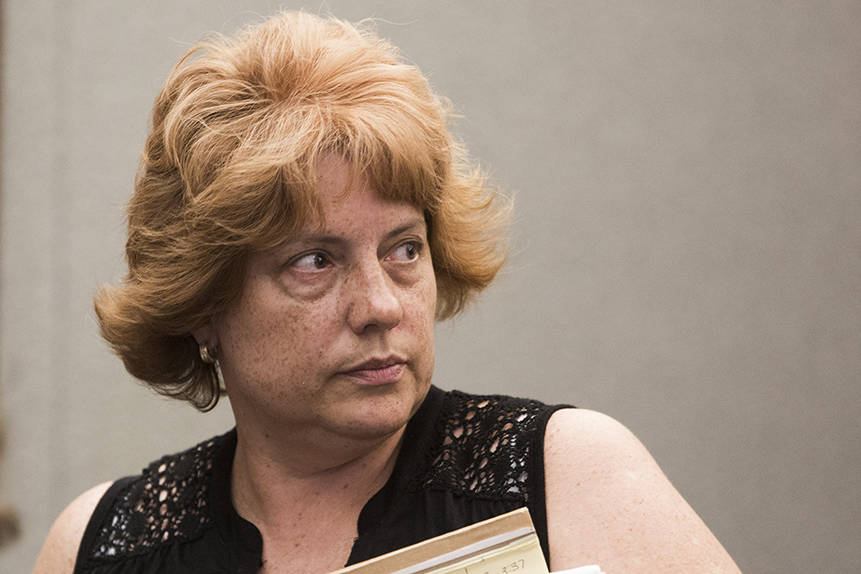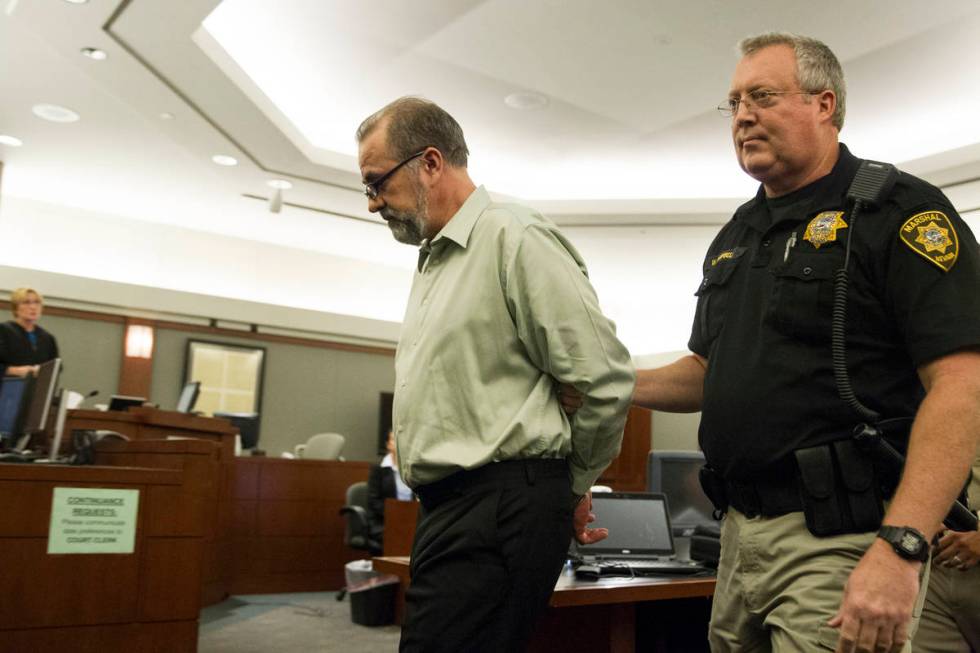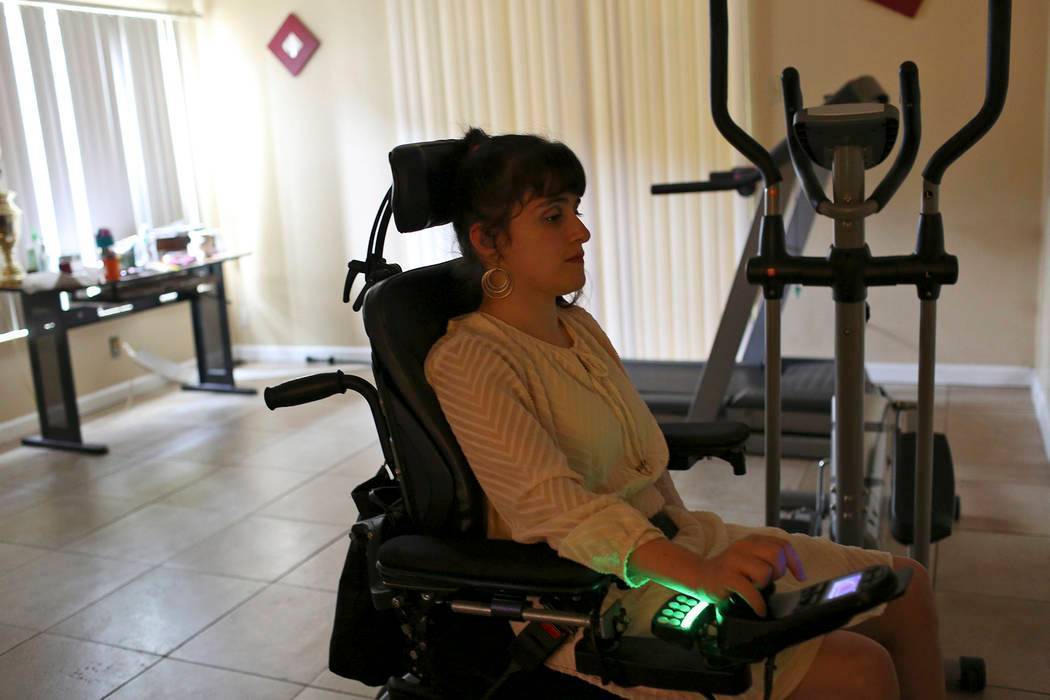Juanita Thompson fought for years to get her former divorce attorney to repay all the money she stole from Thompson and other clients.
At the 2019 parole hearing for disbarred attorney Jeanne Winkler, Thompson was shocked to learn Winkler had the wherewithal to open a flower shop while serving her sentence but had only paid a fraction of the $143,000 in restitution a judge ordered Winkler to pay to nine victims.
Thompson, a Las Vegas resident, urged the parole board to keep Winkler in prison until she paid the full amount. But Thompson said parole staff told her nothing could be done before the board released Winkler, who served slightly more than two and a half years of a maximum seven-year sentence.
“I was told at the parole board now I’m on my own,” said Thompson, providing records that showed she received about $2,900 of the more than $50,000 in ordered restitution from Winkler. “’The state has done everything in its power, and now its up to you.’ It’s been up to me the whole time.”
Like Thompson, many crime victims in Nevada and around the country only receive a fraction of restitution. Flawed policies and offenders who clearly don’t have the money to pay are to blame, a Review-Journal investigation has found.
Since 2015, judges in Clark County have ordered about 4,200 offenders, including Winkler, to pay at least $80 million in restitution, but the Clark County district attorney’s office has only collected about $1 million of that, data shows. The state’s Division of Parole and Probation refused to provide any information about its collections, citing state law that keeps parole information private.

Two years ago, Nevada voters passed a constitutional victim’s rights amendment, dubbed Marsy’s Law, that, in part, required all victims to receive “full and timely restitution,” but lawmakers, prosecutors and state and court officials have made few, if any, significant changes to ensure that happens, the Review-Journal found.
There is also no central public repository in Nevada for tracking restitution, and even the Clark County district attorney’s office couldn’t access restitution collected from Winkler by other agencies, like the state Division of Parole and Probation.
The State Bar of Nevada operates a Clients’ Security Fund, into which attorneys contribute, to pay victims of attorney fraud and theft. Winkler told the parole board in 2019 all of her victims were compensated by that fund, and she is repaying the bar.
The bar association provided records showing Winkler repaid $6,015 — about 4 percent of what the bar paid her victims. Winkler has paid close to $14,000 in additional restitution based on estimated monthly payments during her house detention and parole, but she would not provide records confirming the amount.
Thompson received $50,000 from the fund, but she says with legal bills and the money Winkler stole, she is out at least $20,000 more than she received.
Winkler, who finished her parole in February, maintained she paid her restitution debt. “Your information is wrong because I have (paid restitution) so thank you very much,” she told the Review-Journal before hanging up during a phone call from her Tonopah shop, Sagebrush Dreams Flowers and More.
Patricia Wenskunas, founder and CEO of the California-based Crime Survivors Resource Center, said restitution around the country is seriously flawed and often re-victimizes crime victims. “The DAs, judges, probation I believe care, but they may be overwhelmed,” she said. “There’s no system in place to collect restitution, and the left hand doesn’t talk to the right hand.”
Department of Public Safety spokeswoman Kim Y. Smith declined to set up an interview on restitution. She provided policies and an executive order showing a parole officer determines how much restitution the offender can afford while still meeting living expenses; and if the parolee fails to pay that amount, he or she loses good-time credits off a sentence.
“If the offender lacks the funds to pay the full monthly restitution payment, officers work with the offenders to develop a realistic budget based on their income and existing expenses,” she wrote in an emailed statement.
Smith said privacy laws prohibit her from discussing what due diligence parole officers took to determine how much Winkler could pay in restitution, but she said officers can request pay stubs, tax returns and other documents.
Victim rights
Marsy’s Law set up formal victim rights in the state’s constitution, but victims say if the state were serious about restitution, lawmakers would have formed a new agency to find and go after offender assets.
Jim Wheeler, a Gardnerville Republican who was the minority floor leader during the 2019 session, said Democrats have pushed to restore offender rights even if they didn’t pay their restitution. “It seems to me we’re headed in the wrong direction,” he said.
In the 2019 session, Assembly Bill 416 changed the law regarding collection of fines and restitution to prevent agencies from reporting the failure to pay to collection agencies or allowing the court to request that prosecutors collect the money.
“It is well past time for Nevada to be smart on crime,” Assemblyman Steve Yeager, D-Las Vegas, said when introducing criminal justice reform during the 2019 session. Senate Majority Leader Nicole Cannizzaro, D-Las Vegas, and leaders of the Assembly Judiciary Committee did not return calls and emails seeking comment about restitution and AB416.
The parole board’s 2001 policy requires an offender to split outstanding restitution into equal monthly payments for each month of parole, but offenders can ask for a hearing to convince officials that the restitution is a “financial hardship” and can’t be met. While the parole board can demand documentation of hardship, it’s not clear if or how often it happens because the parole board doesn’t keep statistics on hardship hearings. There is no record of Winkler requesting such a hearing, staff said.
The most significant change in response to Marsy’s Law was a policy that prioritized restitution over court fees and fines, records show.
And the state Department of Corrections tried to increase collections by docking inmate accounts up to 80 percent for restitution. But Gov. Steve Sisolak, Attorney General Aaron Ford and Secretary of State Barbara Cegavske voted to suspend the policy in October — a month after it was implemented.
The American Civil Liberties Union was critical of the Corrections Department practice, saying Marsy’s Law doesn’t require depriving prisoners of the money for basic needs.
But Hawaii’s Crime Victim Compensation Commission gained national recognition from the Council of State Governments Justice Center for doubling restitution collections in five years by garnishing 25 percent of inmates accounts. “The offender needs to be held accountable,” said commission Executive Director Pamela Ferguson-Brey. “What our project has shown is that people can pay.”
Failure to collect restitution
Nevada parole board spokesman David M. Smith said officials can only go to court to keep an offender in prison if they can prove the parolee is willfully hiding money, but that rarely happens.
“We don’t have debtors prison,” he added. “They should pay a reasonable amount every month. The law’s set up so that if you can’t pay, we cannot punish you because you can’t pay.”
Once a convict finishes parole without paying full restitution, any money owed becomes a civil lien.
UNLV law professor Eve Hanan said victims can use that lien to garnish wages and encumber property often without the need for an attorney, but she concedes that tracking assets requires the help of pricey legal counsel or an aggressive government agency with subpoena power.
“It can be a bit of a fiction that restitution will be paid,” said Hanan, adding the vast majority of offenders have no money to pay restitution. “Does Marsy’s law create an obligation for the state to do collections? That’s an open question.”
The failure to collect restitution is common around the country.
A 2018 Government Accountability Office study found that federal officials collect very little court-ordered restitution.
At the end of the 2016 fiscal year, only about $800 million of the $110 billion in ordered restitution was collected, the study found. But the GAO determined the U.S. Department of Justice failed to seize $10 billion from criminals who could pay, the report shows.
In Nevada, federal prosecutors and court officials refused to provide local restitution data.
“My office has reviewed the feasibility of, and the required time involved in, providing the requested data against our obligations to serve the public,” U.S. District Court Clerk Debra Kempi wrote. “After careful consideration, my office will not be able to provide the information you have requested.”
Nevada state auditors also have not looked into collection practices, according to the legislative and executive branches.
Clients lose millions to attorney
The largest ordered restitution in Clark County in the past five years was the case of attorney Robert Graham, who stole millions of dollars from dozens of clients, records show. Graham was sentenced to 16 to 40 years in prison in 2017 and ordered to pay more than $16 million in restitution, but his victims say they received no help from parole staff or prosecutors in locating any money or assets.
Many have given up. Some received $50,000 from the bar’s victims’ fund, but most lost 10 or 20 times that much.
Thane Parton, who lost $487,000 to Graham, according to court records, is driven to find any assets he can. But he says his attempts were thwarted by the Clark County district attorney’s office.
Parton and his wife, Karen, had hired Graham to handle an inheritance after his mother died. At the time the theft was uncovered, he was undergoing chemotherapy treatment for cancer. “He needed time to take care of himself,” Karen Parton said.
The couple went to the FBI to find experienced investigators who could find assets and said federal agents agreed to help. At Graham’s sentencing, Thane Parton said he approached Chief Deputy District Attorney Jay P. Raman to see if the district attorney’s office would turn over all their files to the FBI. Raman, who did not respond to requests for comment, agreed, according to the Partons.
But when the FBI contacted the office, they were told the district attorney’s office would handle the assets search, Thane Parton said. FBI Special Agent Mark Neria said he did not know if the district attorney’s office rejected any bureau offers of help to find Graham’s assets.

“They talk a good game,” Thane Parton said. “It’s good for the TV cameras, but once that’s done, you’re kind of forgotten about. There’s still not one dime given to victims.”
Karen Parton said a private attorney wouldn’t be able to follow the money trail, so victims need the government’s help.
“We can’t ask the banks for information or get records from the IRS,” she said.
The Partons and other Graham victims heard he donated money to the Mormon Church, Boys Town Nevada, where he served on the board, and Colorado State University’s athletics program.
Church spokesman Sam Penrod declined to disclose how much Graham donated but said the church would not knowingly accept stolen money. “We are in the process of working with the court-appointed bankruptcy trustee for his law firm to return any and all donations that are traceable to his fraud,” he wrote in an emailed statement.
Thane Parton said Graham gave more than $100,000 to the church and the church has returned some of the donations to the bankruptcy court, but much of the recovered money is going to pay the trustee and lawyers. A Boys Town spokeswoman did not respond to requests for comment, and CSU declined to discuss donors.
Lost settlement money
Graham stole more than $1 million from Las Vegas resident Barbara Macknin, according to court records.
Her husband, Michael, was dying of asbestos-related cancer, when he saw television ads urging people with mesothelioma to join a lawsuit. The former New Jersey police officer and special investigations manager at Caesars Entertainment casinos was exposed to asbestos as a teen in the Navy. He knew he probably would die before seeing any settlement. But he wanted to make sure his wife was taken care of.
Since being diagnosed with a neurological disorder similar to Parkinson’s and breaking her shoulder during a fall, Barbara Macknin said she requires daily in-home care. The $1 million Graham stole would have helped pay health care aides.
Macknin said she would like to see the Legislature set up a specific division solely dedicated to collecting restitution and identifying a criminal’s assets. “The DA’s office made very strong statements in the court, but nothing ever happened,” she said.
The district attorney’s staff answered some questions by email but would not agree to an interview about restitution. Graham’s public defender, Bryan Cox, said most of the stolen money and assets are gone.
Lawyers, some working for free, filed a bankruptcy claim against Graham’s defunct law office to try to find assets, but some victims say that has just been another hassle and pointless expense.
Macknin said an attorney tried to bill her $68,000 for attempting to freeze Graham’s accounts. She negotiated it down to $13,000. “They expect me to go get the restitution myself, but it was costing me money instead of seeing restitution,” she said. Macknin settled for the $50,000 from the bar association and decided just to live on the portion of the asbestos settlement that wasn’t sent to Graham’s law firm.
 Since being diagnosed with a neurological disorder similar to Parkinson’s and breaking her shoulder during a fall, Barbara Macknin said she requires daily in-home care to live an independent life. The $1 million attorney Robert Graham stole would have helped pay health care aides. She holds a photo of her late husband, Michael. (Mackenzie Behm/Las Vegas Review-Journal)
Since being diagnosed with a neurological disorder similar to Parkinson’s and breaking her shoulder during a fall, Barbara Macknin said she requires daily in-home care to live an independent life. The $1 million attorney Robert Graham stole would have helped pay health care aides. She holds a photo of her late husband, Michael. (Mackenzie Behm/Las Vegas Review-Journal)  Barbara Macknin and husband, Michael, shown in their wedding photo. The Macknins hired attorney Robert Graham to help them with asbestos settlement money. The former New Jersey police officer and special investigations manager at Caesars Entertainment casinos was exposed to asbestos as a teen in the Navy. He knew he wouldn’t benefit from the money. But he wanted to make sure Barbara was taken care of when he was gone. (Courtesy Barbara Macknin)
Barbara Macknin and husband, Michael, shown in their wedding photo. The Macknins hired attorney Robert Graham to help them with asbestos settlement money. The former New Jersey police officer and special investigations manager at Caesars Entertainment casinos was exposed to asbestos as a teen in the Navy. He knew he wouldn’t benefit from the money. But he wanted to make sure Barbara was taken care of when he was gone. (Courtesy Barbara Macknin) The Partons said the people working on the bankruptcy case against Graham won’t return their calls. Trustee Shelley D. Krohn did not return requests to comment from the Review-Journal.
Sharona Dagani, who has cerebral palsy, lost half a million dollars of a medical malpractice settlement to Graham’s theft, court records show. Confined to a wheelchair, she received $2 million as compensation for mistakes during her birth that caused the disorder.
Dagani didn’t even receive the $50,000 from the bar association because the bar committee handing out the money determined Graham acted as her financial adviser and not just her attorney. A lawyer representing Dagani and bar officials concede there is no appeal process to get Dagani money.
Her mother, Joan Albstein, said Dagani, who lives in Texas, relies on money Albstein provides. Dagani’s husband also helps care for her. “She’s a quadriplegic, and she can’t do anything for herself,” said Albstein, who lives in New York.
Albstein said prosecutors and parole officials haven’t even contacted the family about restitution. “They just washed their hands of it,” Albstein said. “The only thing we heard is we would know when he was up for parole and could do our part to keep him in jail.”


Parole release
Winkler, the disbarred attorney who opened a flower shop, said she did everything expected of her by prison and parole officials.
Winkler served less than a year in prison and then was released to in-home detention in September 2017. On Sept. 12, 2018, she incorporated Sagebrush Dreams Inc. to open the Tonopah flower shop. In July 2019, she was paroled and finished the supervision in February, Corrections Department records show. Her prison sentence was 30 to 84 months, records show.
Her attorney, C. Benjamin Scroggins, told the Review-Journal she paid about $460 a month in restitution while serving her sentence. At that rate it would take her 25.9 years to pay the $143,000 ordered. Winkler did not provide records of her payments, but for her parole and home incarceration period, $460 a month would amount to about $14,000.
“I paid the restitution amount that I was required to based upon my income each and every month that I was on house arrest and it is my understanding that it was prorated amongst my victims,” she wrote in an email to the Review-Journal after hanging up on the phone interview.
Scroggins contends Winkler has 2 percent equity ownership in the flower shop, which is owned by Winkler’s mother. She did not put any money into the business but works there for the equity, he wrote in email exchanges with the Review-Journal. “The business itself has not enjoyed a net income and as such, she has not received any distributions,” he wrote.
Incorporation records show Winkler’s mother, Karen J. Brown, is a director in the business, but the documents list Metzger — Winkler’s married name — as president, secretary, treasurer and a director.
And in an effort to gain release from confinement, Winkler told the parole board in February 2019 that it was her business. “I now own a business,” she said. “I’ve opened a flower shop in Tonopah that I have a manager running right now.”
Federal case
Winkler, in emails and at the parole hearing, said she is due restitution as a victim of former Family Court Judge Steven Jones, who pleaded guilty to fraud in a fake investment scheme.
The bar association received about $6,000 on Winkler’s behalf from the Jones case between 2015 and 2020, records show. Winkler also paid $28,000 to victims between 2008 and 2010 before the state court restitution order, but prosecutors in court filings contend those payments were to victims not involved in the Clark County criminal theft case.
In a separate federal criminal case against her, Winkler was ordered to pay $47,000 in restitution and sentenced to three years of supervised release after pleading guilty to federal fraud charges in a 2015 scheme to take over and defraud homeowners associations.
During her 2016 sentencing for stealing from clients, Clark County prosecutor Raman wrote that Winkler has a history of not paying restitution, noting at the time that she had only paid $1,358 of the $47,000 ordered in the federal HOA case.
“The Defendant will not pay any significant portion of the restitution as she has demonstrated a history of not paying,” Raman wrote in a sentencing memo. “Therefore, it is a fallacy or empty promise that the victims, or through subrogation the State Bar of Nevada, will be repaid.”
Winkler victim Thompson said she was never informed of her rights under Marsy’s Law or received any help from prosecutors or parole officers. “The law has no teeth so what purpose does it serve?” she said. “The whole thing makes me feel horrible. I feel taken advantage both by Winkler and the system.”
Contact Arthur Kane at akane@reviewjournal.com. Follow @ArthurMKane on Twitter. Kane is a member of the Review-Journal’s investigative team, focusing on reporting that holds leaders and agencies accountable and exposes wrongdoing.



